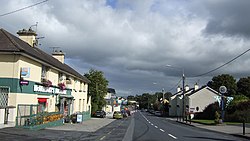Town in Munster, Ireland
| Patrickswell Irish: Tobar Phádraig | |
|---|---|
| Town | |
 Main Street Main Street | |
 | |
| Coordinates: 52°35′43″N 8°42′44″W / 52.5952°N 8.7122°W / 52.5952; -8.7122 | |
| Country | Ireland |
| Province | Munster |
| County | County Limerick |
| Elevation | 30 m (100 ft) |
| Population | 848 |
| Irish Grid Reference | R518500 |
Patrickswell, historically known as Toberpatrick (Irish: Tobar Phádraig), is a small town in County Limerick, Ireland. It is primarily a commuter village for people working in Limerick, including the nearby industrial suburb of Raheen. The population was 848 at the 2022 census.
Etymology
The name of the town refers to a holy well which is traditionally associated with Saint Patrick. Located on the main street, this well was previously capped by a pump - since removed. In the early 19th century, a rough statue of Saint Patrick was erected at the well.
History
Evidence of ancient settlement in the area includes a number of ringfort, fulacht fiadh and lime kiln sites in the surrounding townlands of Attyflin, Ballyanrahan East and Barnakyle. Protected structures, within the town, include St. Patrick's holy well, an 18th century milestone, a lime kiln and the 19th century Royal Irish Constabulary barracks.
The former Patrickswell Railway Station, also a protected structure, was built in 1856 on the main Limerick–Tralee railway line. No longer used as a railway station, it is now in private ownership and home to an engineering consulting firm. A contemporary extension to the original station building was designed by Rob Shanahan architects and won an OPUS Building of the year award in 2004.
According to local historian Mainchín Seoighe (1924–2006), the present day ecclesiastical parish of Patrickswell-Ballybrown is made up parts of the pre-Reformation parishes of Kilkeedy, Killonahan, Mungret, Croom, and Adare. Until the middle of the 18th century, the parishes of Kilkeedy and Clounanna were joined with Adare. When the parish of Patrickswell was formed, Kilkeedy and Clounanna became part of the new parish.
During the Irish Civil War, the town played a role in the Battle of Kilmallock of 1922, when Anti-Treaty IRA troops dug in at Patrickswell to prevent Pro-Treaty National Army forces from reaching Limerick city.
Location and transport
The town is located near to the N20/N21 road which, until Patrickswell was bypassed in 2001, ran through the town centre. This road is now the R526 from west of the town to Limerick city. The town can be accessed at either end from the N20 junction for Limerick Racecourse, or the N20/N21 junction further west (where the R526 commences).
A railway line to Adare and Foynes passes alongside the town to the south, although Patrickswell station is long closed. Patrickswell railway station originally opened on 12 July 1856, closed for passenger traffic on 4 February 1963 and finally closed altogether on 2 December 1974. The Ballingrane–Tralee (North Kerry) line closed in November 1975. The station was, at one time, known as Patrickswell Junction and direct Limerick–Cork trains diverged here from the route of trains bound for Foynes, Newcastle West and Tralee. While passenger services ceased in 1963, freight trains between Limerick and Foynes ran until 2000.
Amenities
Patrickswell's main street has several shops, a garage, ATM and a post office. The town is located approximately 10 km from Limerick city, and as a result relies on the city and its suburbs for secondary schools, shops, banks and other facilities.
There are several housing estates in the area, including several off the main street and road to Clarina. The latter road has strip development north from Patrickswell all the way to Clarina and the N69 road.
Politics
Patrickswell is located with the Limerick City West local authority area of Limerick City and County Council and within the Limerick City constituency for national politics.
See also
References
- ^ "Patrickswell (Ireland) Census Town". citypopulation.de. Retrieved 12 December 2023.
- ^ "Tobar Phádraig/Patrickswell (see archival records)". logainm.ie. Placenames Database of Ireland. Retrieved 7 December 2023.
- ^ Patrickswell Local Area Plan 2015-2021 (PDF) (Report). Limerick City and County Council. April 2015. Retrieved 12 December 2023.
- Lewis, Samuel, ed. (1837). "Patrick's Well (St.)". A Topographical Dictionary of Ireland. Lewis.
- ^ Caoimhín, Ó Danachair (1955). "The Holy Wells of Co. Limerick". The Journal of the Royal Society of Antiquaries of Ireland. 85 (2): 213. JSTOR 25509218.
- Record of Monuments and Places - County Limerick. Dublin: National Monuments and Historical Properties Service. 1997.
- ^ Limerick Development Plan 2022-2028 - Volume 3A - Record Of Protected Structures - Metropolitan District of Limerick (PDF) (Report). Limerick City and County Council. June 2022. p. 250. Retrieved 7 December 2023.
- "Patrickswell Railway Station, Chapelbride, Patrickswell, Limerick". buildingsofireland.ie. National Inventory of Architectural Heritage. Retrieved 7 December 2023.
- "Irish National Army Sweeping On". ifiarchiveplayer.ie. Irish Film Institute. Retrieved 7 December 2023.
- "Patrickswell station" (PDF). Railscot - Irish Railways. Retrieved 22 November 2007.
- "Local Electoral Area Boundary Committee No. 1 Report 2018 - Limerick Metropolitan District" (PDF). boundarycommittee.ie. Retrieved 12 December 2023.
| Roman Catholic Diocese of Limerick | |||||||||||||||||||
|---|---|---|---|---|---|---|---|---|---|---|---|---|---|---|---|---|---|---|---|
| Province | Roman Catholic Archdiocese of Cashel and Emly | ||||||||||||||||||
| Ordinaries | Bishop of Limerick | ||||||||||||||||||
| Cathedral church | St John's Cathedral (Limerick) | ||||||||||||||||||
| Parishes |
| ||||||||||||||||||
